Why German e-commerce businesses choose Poland as a fulfillment center location?
Written by
Editorial TeamPublished on
Discover why Poland is becoming the top choice for German e-commerce businesses seeking efficient logistics solutions. From cost savings and modern infrastructure to unmatched flexibility and strategic market access, explore how Polish fulfillment centers are reshaping cross-border e-commerce dynamics. (Ad)
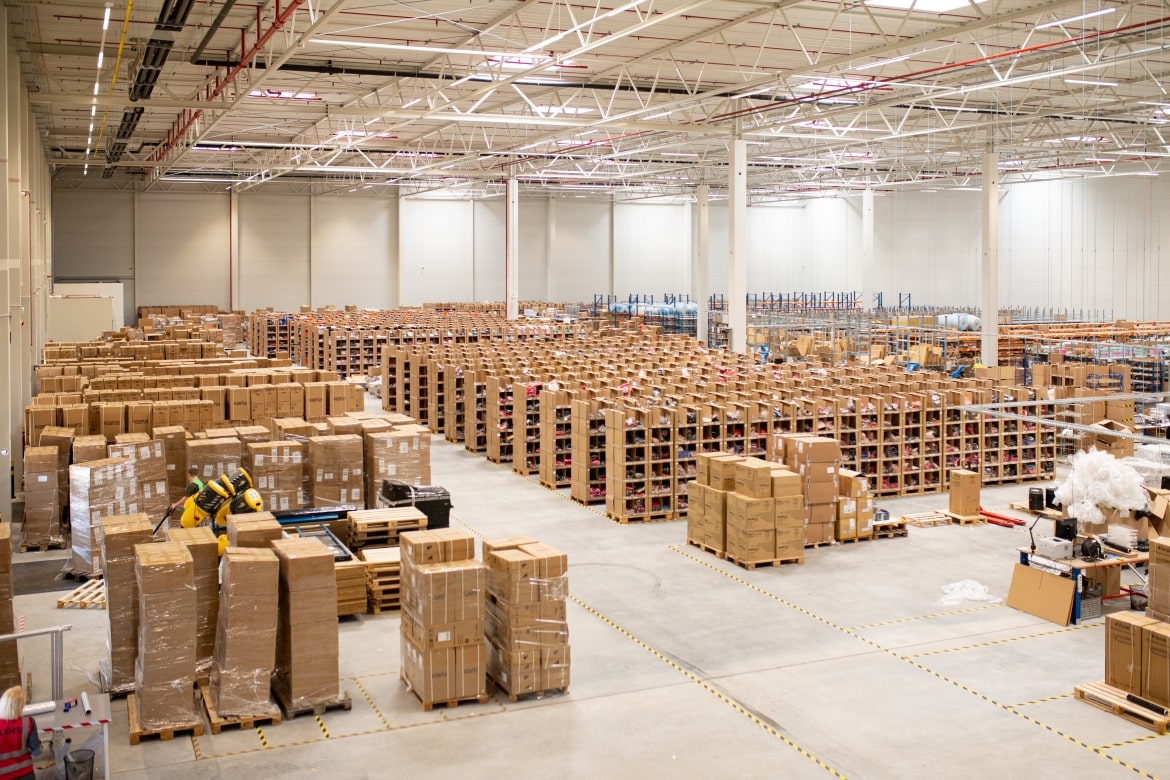
Commercial collaboration
In recent years, a growing number of German e-commerce businesses have chosen Poland as their preferred location for logistics operations. This trend is driven by a combination of factors dealing with costs and processes. Let’s dive deeper into the key reasons behind this cross-border movement.
Understanding Germany’s e-commerce landscape
Germany is home to one of the largest e-commerce markets in Europe, with revenues estimated to reach 94.5 billion EUR in 2024.
Germans have become a nation of online shoppers, with 99% of adults making purchases online and over a fifth doing so several times a month, reflecting the high frequency of e-commerce activity. This booming market, with a penetration rate of 60% and a forecasted user base exceeding 51 million by 2029, underscores the growing demand for efficient logistics solutions. Dominated by giants like Amazon.de, the sector is characterized by fierce competition and the need for cost-effective infrastructure.
As businesses strive to maintain profitability in a high-cost environment, many are turning to neighboring Poland, where lower operational costs and a strategic location offer significant advantages for managing the logistics demands of this massive market. At Omnipack, a fulfillment company based in Poland, Germany is the top market outside Poland, with 61% of merchants shipping to Germany – spanning both German e-commerce businesses and companies from across Europe. Additionally, 86% of Omnipack’s German merchants ship with them across the entire European market, highlighting Poland’s pivotal role in enabling cross-border growth.
Cost efficiency…
One of the primary reasons German businesses look to Poland is the significant cost savings in warehouse handling and labor. The hourly wage for warehouse staff in Poland is approximately €7, compared to around €14 in Germany. This translates to a 50% reduction in labor costs, which can result in overall operational savings of 30-50%, depending on the volume and complexity of services required.
…Without sacrificing speed of delivery
Despite these cost savings, Polish fulfillment providers offer comparable lead times. Speed of delivery from Poland meets German market expectations, with 1-day shipping being the standard at top Polish fulfillment centers. Despite sending packages from Poland to Germany, they can match delivery times offered by German providers at a fraction of the cost.
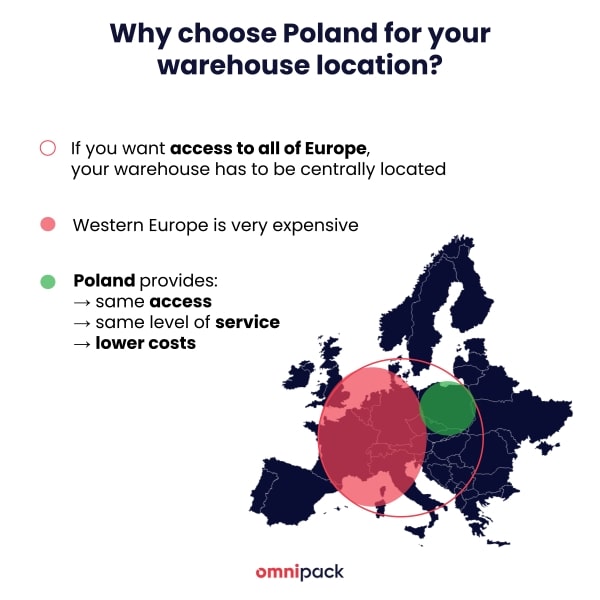
Advanced infrastructure and modern processes
Poland’s logistics market has emerged as a modern, well-organized alternative to Germany’s saturated landscape. For years, Germany’s massive e-commerce market attracted companies from across Europe, leading to overburdened fulfillment centers. With a steady influx of clients, many German facilities had little incentive to modernize, resulting in outdated warehouses, limited flexibility, and subpar online integrations.
In contrast, Poland’s younger but experienced logistics market boasts state-of-the-art facilities and streamlined processes. Polish warehouses are better organized and equipped with cutting-edge technology, enhancing efficiency and reducing errors. Additionally, Poland’s less saturated market allows for easier expansion and scalability. German e-commerce businesses visiting Polish fulfillment centers are often surprised by the high level of organization, advanced equipment, and seamless communication – far exceeding expectations of “traditional Poland.” This modernity, combined with room for growth, makes Poland an increasingly attractive choice for logistics operations.
Superior customer service and flexibility
Flexibility and personalized customer service are hallmarks of Polish fulfillment providers. German businesses often find their domestic counterparts rigid and standardized, with a “take it or leave it” approach. For instance, an e-commerce company shipping 10,000 packages might barely register as significant to a German fulfillment center. In such cases, businesses are often presented with a fixed list of services and prices, with little room for customization or negotiation. Requests for tailored solutions are frequently met with a blunt “no, that’s not an option.
In Poland, the story is very different. With a less saturated market, Polish providers actively compete for clients, treating a company shipping 10,000 packages as an important partner. Fulfillment centers go to great lengths to accommodate specific client needs, offering tailored solutions and competitive rates for B2C and B2B shipping to various markets. While not every request can be met, Polish providers demonstrate a willingness to listen, adapt, and go the extra mile to support clients. This level of care and flexibility makes Polish fulfillment centers especially appealing to mid-sized e-commerce businesses seeking a personalized and client-focused approach.
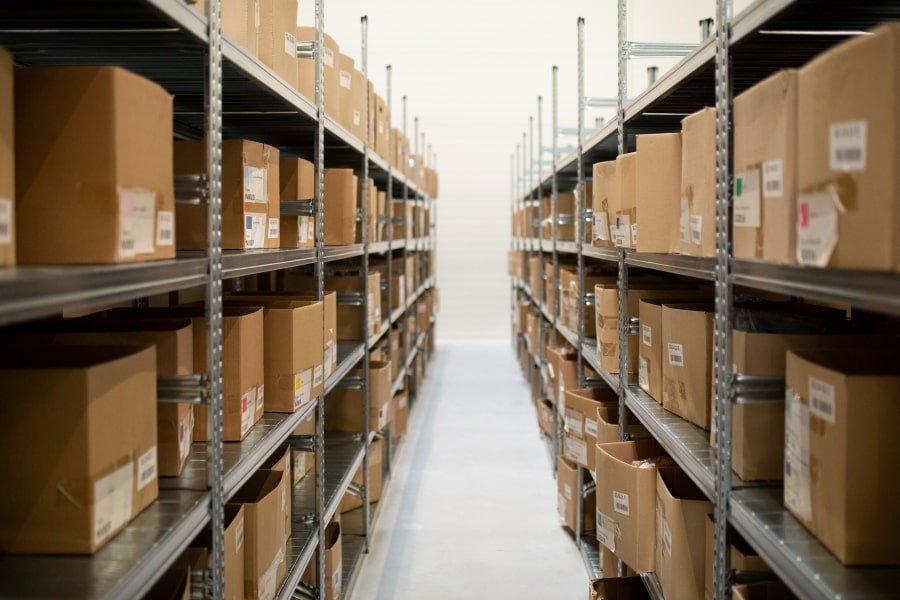
German-language support and local returns
One of the main concerns for German e-commerce businesses considering a transition to Polish fulfillment centers is the potential language barrier. However, this fear is unfounded, as top Polish providers offer comprehensive German-speaking support teams. These teams ensure seamless communication, making the transition smooth and eliminating any operational hurdles related to language differences.
Polish fulfillment centers also match the standard services offered in Germany, addressing another potential worry for businesses. For instance, they provide German return addresses, a critical feature for industries like fashion, where return rates often exceed 30-40%. Customers don’t have to worry about higher costs or extended return processing times, as the return process is indistinguishable from what they experience with German providers.
Additionally, Polish providers offer services like Klein Packet, a shipping standard widely used in Germany, particularly for small items. Many German e-commerce merchants are pleasantly surprised to find this service available in Poland, as it is considered essential for efficient and cost-effective logistics. These capabilities demonstrate that Polish fulfillment centers not only overcome language barriers but also meet and often exceed the expectations of German e-commerce businesses.
Workforce management
While the European logistics market relies heavily on immigrant labor, Poland has a unique advantage with its workforce largely composed of Ukrainian immigrants. Shared cultural and linguistic ties foster smoother communication, better team cohesion, and lower turnover rates. This translates to fewer errors and improved efficiency in Polish logistics operations. In contrast, Germany’s workforce diversity often poses communication challenges, leading to higher turnover and inefficiencies.
Access to Central and Eastern European Markets
Poland’s strategic location makes it an ideal gateway to the rapidly expanding Central and Eastern European (CEE) markets. Historically, CEE was considered a minor player in e-commerce, which left German fulfillment centers without established networks or competitive shipping rates for the region. However, the situation has shifted dramatically – CEE is now a significant and lucrative market segment. From Poland, businesses can access these markets at costs that would be unattainable from Germany.
Polish fulfillment centers are optimized for regional distribution, enabling seamless access to countries like the Czech Republic, Slovakia, and Hungary. Increasingly, we see German e-commerce companies recognizing the value of the Polish market itself, with many businesses already entering or actively expanding their presence here. Poland is no longer just a convenient stopover; it is a key market in its own right, and leveraging its logistical advantages opens doors to both local growth and broader CEE opportunities. This dual benefit – competitive costs for German fulfillment and unparalleled access to CEE – makes Poland an indispensable hub for cross-border e-commerce.
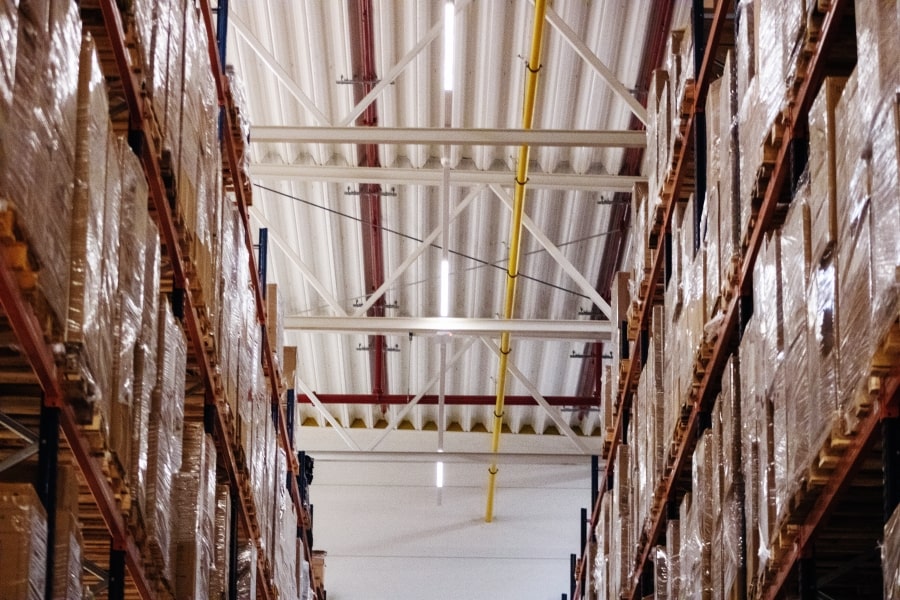
Marketplaces and B2B shipping
While the B2C market continues to grow, its pace has slowed since the pandemic, prompting many e-commerce companies to seek new avenues for expansion – particularly in the B2B sector. Leading Polish providers have well-established B2B operations and a deep understanding of the unique requirements for preparing orders to meet the standards of top retailers and marketplaces.
Top fulfillment centers, like Omnipack, are integrated with over 30 marketplaces and retailers, including Amazon, Zalando, Douglas, Sephora, and many more, enabling seamless order fulfillment across Europe. This robust network and cutting-edge solutions give German businesses the flexibility to scale their operations across both B2C and B2B segments. By leveraging Poland’s expertise in multi-channel fulfillment, businesses can stay competitive in an increasingly complex and interconnected e-commerce landscape.
Conclusion
Poland’s unique blend of cost-efficiency, modern infrastructure, operational flexibility, and strategic market access has firmly established it as a preferred destination for German e-commerce businesses.
By partnering with Polish fulfillment providers, German companies not only reduce costs but also gain access to cutting-edge logistics solutions, expand into new markets, and enhance their competitive edge in an increasingly dynamic industry. Poland is more than a logistics hub; it is a strategic partner for sustainable growth in Europe’s evolving e-commerce landscape.
About the Authors
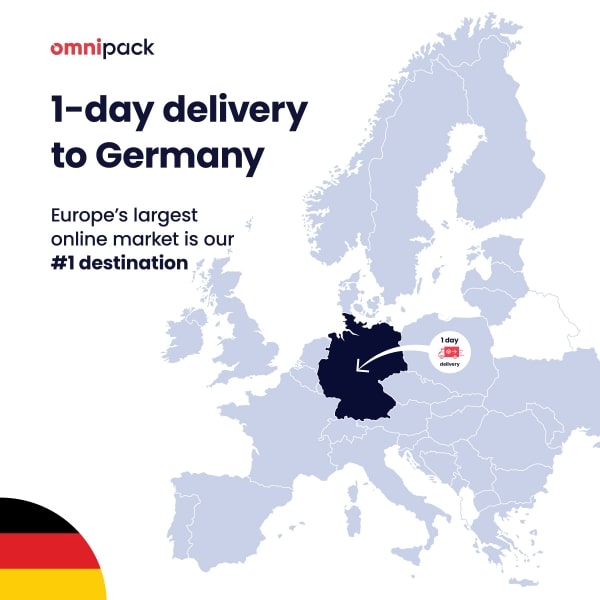
Omnipack is one of the leading fulfillment operators in Europe. We’ve been supporting the growth of e-commerce since 2016. We cover all B2C and B2B logistics processes for over 100 online stores, including inbounding, warehousing, pick & pack, deliveries, returns, and data integration. We maintain the highest quality standards (99.96% perfect order ratio) even during sales peaks. With Omnipack on board, brands can grow beyond borders, unconstrained by the physical. With a full cross-border infrastructure, we fulfill orders to 40+ countries. We have already sent 8 million parcels around the world.
***


